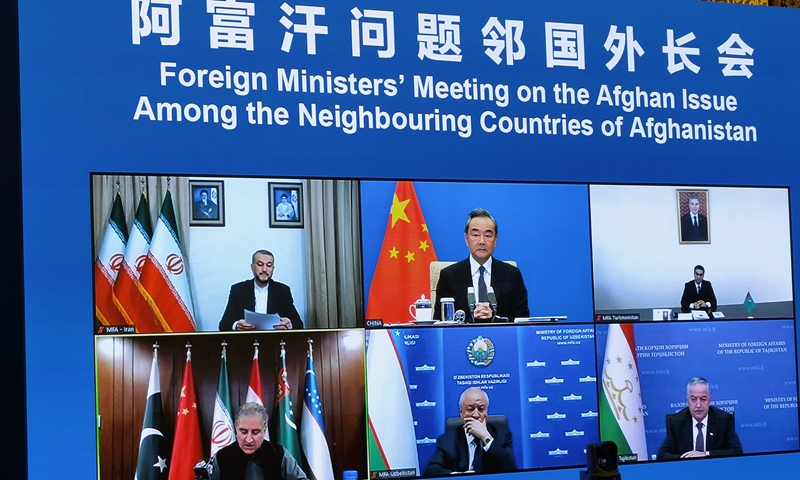
Photo: CGTN
China will provide Afghanistan 200 million yuan ($31 million) worth of grains, winter supplies, vaccines and medicines in line with the needs of the Afghan people, Chinese State Councilor and Foreign Minister Wang Yi said during a meeting with his counterparts from Afghanistan neighboring countries on Wednesday, one day after the Afghan Taliban announced a new interim government.
Experts noted that China's move to participate in the cooperation mechanism and provide humanitarian aid is to help Afghanistan in its counter-terrorism fight, as poverty, starvation, and suffering are all factors for potential chaos that could become a hotbed for terrorism.
"Today's Afghanistan is at the crossroads facing many challenges, including humanitarian crisis, livelihood, COVID-19 epidemic, and some international forces are likely to create new problems for it through political, economic and financial means," Wang said via video link at the meeting, pointing out that "the establishment of a new interim government has shown that the future of Afghanistan is still faced with uncertainties."
Wang called on the neighbors to seize the key opportunity, boost communication and coordination, focus on common concerns, and exert more positive influence on the development of the situation in the country while respecting Afghanistan's sovereignty, independence and territorial integrity.
This can help to solve Afghanistan's own problems and create a good external environment for its reconstruction, Wang said.
China is willing to work with Afghanistan on epidemic prevention, Wang said, announcing a donation of 3 million doses of COVID-19 vaccines to the country and promising that China will continue to provide more material and technical support.
"China is extending a helping hand at a time when the new interim government was just established and needed external support to help it stabilize," Li Haidong, professor at the Institute of International Relations at the China Foreign Affairs University, told the Global Times on Wednesday.
"The most challenging task the new government faces is economic restoration and epidemic control. China's aid at such a time can both help it restore social order and lay a solid foundation for future friendly interactions," Li said.
Wang called for Afghanistan to keep its ports open on the premise of maintaining security and China in this regard will work on restoring cargo railway services between the two countries.
Elaborating on counter-terrorism coordination, Wang urged the Afghan Taliban to have a clean cut with all terrorist groups and take sound measures to restrain and crack down on their actions.
On anti-drug efforts, Wang said we should encourage the Afghan Taliban's decision to stop producing drugs and said China will take joint actions with relevant parties to combat cross-border drug crimes in the region.
Wang also said that the meeting is "the first attempt by Afghanistan's neighbors to cooperate in response to the changing situation and marks the formal establishment of a coordination mechanism among the neighbors [that is] timely and necessary at this point."
"The meeting will help Afghanistan's neighbors speak with one voice and send a clear political signal, and China supports the running of such a unique mechanism, which will jointly address the challenges," said Wang.
At Wednesday's meeting, Wang stressed that the US and its allies, who started the chaos in the region in the first place, should learn the lesson and assume their due responsibility.
He urged the US and its allies to take actions on the Afghan issue and help it back on the right track, as the international community generally believes that "the end to the US and its allies' military intervention in the region starts with them taking responsibility."
The Afghan Taliban on Tuesday announced key members of its new interim government, whose structure shows that the Taliban wants to ensure its political dominance and absolute control in the country. This also demonstrates that the Taliban at this stage will still prioritize solving internal problems rather than responding to expectations from the international community, Chinese analysts said.




